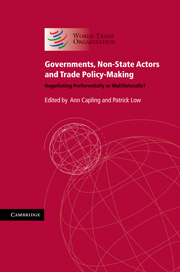Book contents
- Frontmatter
- Contents
- List of figures and tables
- List of contributors
- Acknowledgements
- Disclaimer
- Introduction
- 1 The domestic politics of trade policy-making: state and non-state actor interactions and forum choice
- 2 Chile
- 3 Colombia
- 4 Mexico
- 5 Indonesia
- 6 Thailand
- 7 Jordan
- 8 Kenya
- 9 South Africa
- 10 The influence of international non-state actors in multilateral and preferential trade agreements: a question of forum shopping?
- 11 Main findings and conclusions
- Index
- References
8 - Kenya
Published online by Cambridge University Press: 05 July 2014
- Frontmatter
- Contents
- List of figures and tables
- List of contributors
- Acknowledgements
- Disclaimer
- Introduction
- 1 The domestic politics of trade policy-making: state and non-state actor interactions and forum choice
- 2 Chile
- 3 Colombia
- 4 Mexico
- 5 Indonesia
- 6 Thailand
- 7 Jordan
- 8 Kenya
- 9 South Africa
- 10 The influence of international non-state actors in multilateral and preferential trade agreements: a question of forum shopping?
- 11 Main findings and conclusions
- Index
- References
Summary
Introduction
It is almost axiomatic that trade policies of a country affect in one way or another many sectors of that country and those of its trading partners. In other words, the impact of trade policy quite often goes beyond the participating countries or the direct beneficiaries, be they producers or consumers. One would have thought, therefore, that in line with the principle that the governed must have a voice on matters that affect them, there would be no decision, agreement, treaty, convention or protocol on trade signed without the input of the governed. This, however, is often not the case. Thus, despite the increasing and widening of democratic space in most African countries, trade policy-making in many of these countries is still shrouded in mystery, secrecy and mainly the preserve of the executive branch of government. This situation persists even though most African governments have over the last fifteen years or so tended to embrace participatory planning, which should enlist non-state actors (NSAs) policy-making. Thus, in trade policy-making, NSAs often remain at the periphery of decision-making. One reason for this situation could be that consultation forums, where these exist, are perhaps deliberately limited in numbers and scope of action and, therefore, do not carry much weight.
This chapter examines the trade policy-making regime in Kenya and the role of stakeholders in preferential and multilateral trade negotiations. It analyses the role of state and non-state actors in the trade policy-making process and how the actors can increase their role in influencing the policy outcomes. The chapter is structured in five parts. Section 1 opens. Section 2 provides the background and context of the study, the overview and context of trade policy in Kenya, and its trade patterns over time in terms of the composition of trade and trade partners. Section 3 discusses the role of state and non-state actors in trade policy-making. It highlights the interests of the actors, their specific trade policy aims, sources of their influences and how they seek to exert it. Section 4 contains a discussion and analysis of Kenya’s trade agreements, the influence of NSAs on their negotiation and outcomes, and issues of forum choice. Section 5 concludes.
- Type
- Chapter
- Information
- Governments, Non-State Actors and Trade Policy-MakingNegotiating Preferentially or Multilaterally?, pp. 214 - 248Publisher: Cambridge University PressPrint publication year: 2010



